

Comprenez le, diffusez le, reprenez le pouvoir. Let the governed build the government: Etienne Chouard @ TEDxRepubliqueSquare. The Iceland Example. "After more than 600 years of foreign rule, Iceland's social structure was the most feudal of all Nordic countries at the beginning of the 20th century.
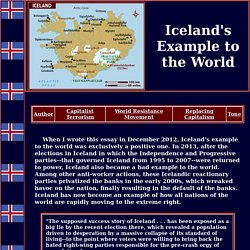
Fishing dominated the economy, generating most of the foreign-currency earnings and allowing the development of an import-based commercial sector. This created urban economic activities: construction, services, light industry. After the second world war the economy grew strongly, because of Marshall Plan aid (there was a large US-Nato military base); an abundant export commodity, cold-water fish, unusually blessed with high income elasticity of demand; and a small, literate population with a strong sense of national identity. The Pirate Wheel. The Pirate Wheel is an overview of pirate policies as I’ve understood them from talking to pirates across the world.
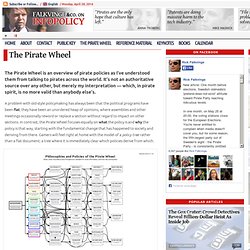
It’s not an authoritative source over any other, but merely my interpretation — which, in pirate spirit, is no more valid than anybody else’s. A problem with old-style policymaking has always been that the political programs have been flat; they have been an unordered heap of opinions, where assemblies and other meetings occasionally reword or replace a section without regard to impact on other sections. In contrast, the Pirate Wheel focuses equally on what the policy is and why the policy is that way, starting with the fundamental change that has happened to society and deriving from there. ‘India in 2047 will be a participatory democracy’ New Delhi, Aug 24 — India will have “direct democracy” by 2047 which will rein in exploitation of countryside and its economy will be “increasingly automated” preying less on natural resources, a leading environmental thinker said Saturday.
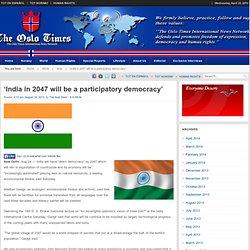
Madhav Gadgil, an ecologist, environmental thinker and activist, said that there will be facilities for universal translation from all languages over the next three decades and literacy barrier will be lowered. L'autorité qui augmente. «La hiérarchie est animale, il n'y a pas de doute là-dessus», déclare Michel Serres, auteur prolifique et professeur à l'université Stanford, dans son billet sur LePoint.fr de vendredi il y a deux semaines.
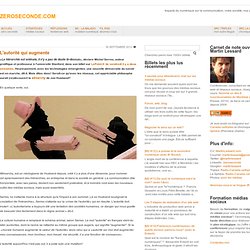
Heureusement, avec les technologies émergentes, une nouvelle démocratie du savoir est en marche, dit-il. Mais dites donc! Serait-ce qu'avec les réseaux, cet appréciable philosophe aurait (re)découvert la wirearchy de Jon Husband? Michel Serres : "La seule autorité possible est fondée sur la compétence". A conversation on TED.com: Reinventing government - what would it look like? The Virtual Town Meeting. The Homebrew Industrial Revolution. Holon & co... Dotmocracy. Noocracy. Noocracy (/noʊˈɒkrəsi/ or /ˈnoʊ.əkrəsi/), or "aristocracy of the wise", as defined by Plato, is a social and political system that is "based on the priority of human mind", according to Vladimir Vernadsky.
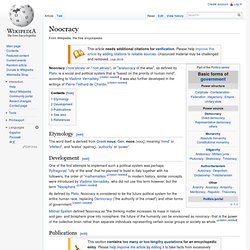
[citation needed] It was also further developed in the writings of Pierre Teilhard de Chardin. [citation needed] Etymology[edit] Development[edit] Tools for Governance. ''The purpose of the game is not really to predict the future, but to discover the issues you need to be thinking about.'' War Game simulation POLITICO, Fort Meade, 4-5 march 2009.
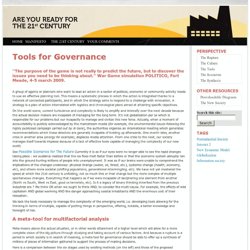
A group of agents or planners who want to lead an action in a sector of political, economic or community activity needs to use an effective planning tool. This means a systematic process in which the action is integrated thanks to a network of connected participants, and in which the strategy aims to respond to a challenge with innovation. A strategy is a plan of action interrelated with logistics and chronological plans aimed at attaining specific objectives. The Desktop Regulatory State. 2. Networks vs. Hierarchies.pdf (Objet application/pdf) 1. Stigmergic Revolution.pdf (Objet application/pdf) A conversation on TED.com: TED: first step towards direct democracy? Emergence of Noopolitik.pdf. Peer2Politics.
"Dynamic Governance" Dynamic Self Governance processes. This is a quick primer to general Dynamic Self Governance processes used in AMC circle meetings.
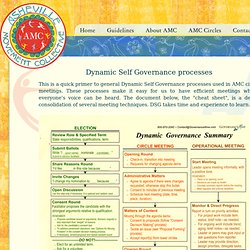
These processes make it easy for us to have efficient meetings where everyone's voice can be heard. The document below, the "cheat sheet", is a dense consolidation of several meeting techniques. DSG takes time and experience to learn. Guiding Principals of Circle. These Guiding Principles of Consultation, Talking Circles Steps for Taking Unified Action and a Non-Political Process for Electing Community Leadership are increasingly being utilized, in various, related forms, in Indigenous and other communities of the Human Family in more than 10,000 locations and 182 Nations, Territories and Islands around Mother Earth.
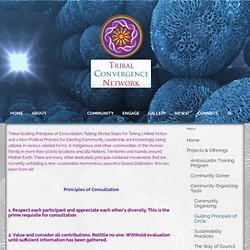
There are many other dedicated, principle-centered movements that are currently unfolding a new, sustainable, harmonious, peaceful Global Civilization. We can learn from all! Principles of Consultation 1. Respect each participant and appreciate each other’s diversity. USGBC-STL DYNAMIC GOVERNANCE STRUCTURE. Wirearchy - About. Bienvenue dans l'ère de la connexarchie! Sociocracy. Sociocracy is a system of governance, using consent-based decision making among equivalent individuals and an organizational structure based on cybernetic principles.[1] The most recent implementation of sociocracy by Gerard Endenburg,[2] also known as Circular Organizing, was developed as a new tool for governance of private enterprise, but has been adopted in many different kinds of organizations including public, private, non-profit and community organizations as well as professional associations.
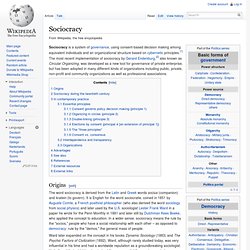
Origins[edit] The word sociocracy is derived from the Latin and Greek words socius (companion) and kratein (to govern). It is English for the word sociocratie, coined in 1851 by Auguste Comte, a French positivist philosopher (who also derived the word sociology from social physics) and later used by the U.S. sociologist Lester Frank Ward in a paper he wrote for the Penn Monthly in 1881 and later still by Dutchman Kees Boeke, who applied the concept to education. Essential principles[edit] Consensus is Not Unanimity. [Back to Starhawk's Activism Page] [Back to the Trainer Resource Index Page] Adapted from Randy Schutt What is consensus?
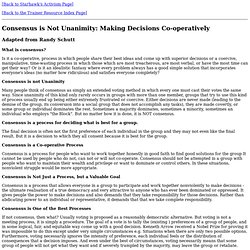
Is it a co-operative, process in which people share their best ideas and come up with superior decisions or a coercive, manipulative, time-wasting process in which those which are most treacherous, are most verbal, or have the most time can get their way? Or is it an idealistic fantasy where every problem always has a good simple solution that incorporates everyone's ideas (no matter how ridiculous) and satisfies everyone completely? Transpartisan. Transpartisanship represents an emerging field in political thought distinct from bipartisanship, which aims to negotiate between “right” and “left,” resulting in a dualistic perspective, and nonpartisanship, which tends to avoid political affiliation altogether.
Rather, transpartisanship acknowledges the validity of truths across a range of political perspectives and seeks to synthesize them into an inclusive, pragmatic container beyond typical political dualities. Transpartisanship is a movement to support and advance a common ground - or "new center" - that already exists in U.S. politics, emerging periodically into public view in the form of "unusual coalitions" of progressives and conservatives around issues ranging from war and the military budget to corporate power and the surveillance state.[1] Current examples of transpartisan initiatives include Transpartisan Center, TheSolution.org, Reuniting America,Transpartisan Alliance, Liberty Coalition. See also[edit] Center for a Stateless Society.
Postpartisan. Post-partisanship is an approach to dispute resolution between political factions that emphasizes compromise and collaboration over political ideology and party discipline.[1] It does not imply neutrality. From 2000-2007, there were virtually no online media references to the term "post-partisan". Media and Web references to the term are growing rapidly as the concept takes hold among policy-makers.The New York Times has attributed an oblique reference to post-partisan idealism in a statement by US President Thomas Jefferson, when he declared in his inaugural address in 1801: "We are all Republicans, we are all Federalists.
The Consensus Network Home Page. Direct Democracy: The International IDEA Handbook. While many books on direct democracy have a regional or national approach, or simply focus on one of the many mechanisms associated with direct democracy, this Handbook delves into a global comparison of direct democracy mechanisms, including referendums, citizens’ initiatives, agenda initiatives and recall. A detailed look into each of these instruments is discussed in a chapter by chapter analysis of each tool, including comprehensive definitions, how each instrument can be used to shape political decisions and an outline of the steps most often involved in planning any given procedure.
Also included as a chapter in the Handbook are possible measures for best practices of implementation, designed for those who wish to tailor direct democracy instruments to their specific needs. In order to further complement the best practices, a variety of global case studies detail the practical uses of direct democracy mechanisms in specific contexts.
Deep Change. Hierarchies to Networks. The network has been recognised as the basic pattern of organisation in all living systems. Ecosystems in nature are essentially networks of organisms. As Fritjof Capra points out, organisms themselves are networks of cells, and cells networks of molecules. An ecosystem is a flexible, responsive, ever-fluctuating network. Its flexibility is a consequence of multiple dynamic sense-and-respond feedback loops that keep the system in a state of dynamic balance. VOXCRACY - LE VOTE INTELLIGENT. ‘Superorganisations’ – Learning from Nature’s Networks. This is a complete version of a ‘long-blog’ written by Al Kennedy on behalf of ‘The Nature of Business’ blog and BCI: Biomimicry for Creative Innovation www.businessinspiredbynature.com I hope you enjoy this ‘long-blog’, as it covers important issues for today’s business paradigm shift and looks at the alignment of digitisation, organisational evolution and ecological thinking (and has useful links throughout for further information).
Fritjof Capra, in his book ‘The Hidden Connections’ applies aspects of complexity theory, particularly the analysis of networks, to global capitalism and the state of the world; and eloquently argues the case that social systems such as organisations and networks are not just like living systems – they are living systems.
Panarchy. Citizen:Me. EDemocrcacy. Pablo -audeladuvotedemocratique. Patrick Woessner's Presentations - Digital Citizenship and Social Media. Open Source Democracy by Douglas Rushkoff - Projet Gutenberg. Active projects - Metagovernment - Government of, by, and for all the people. Open Democratic. A conversation on TED.com: Provide the tools and knowledge for TEDx communities to promote and implement open government and open data initiatives. 12 Papers on Social Media and Political Participation. Peer-to-Peer voting scheme. The following was a class report done together with Valkyrie Savage where we compared my idea for voting described in the previous post with others similar ideas we found around.
This idea is envisioned as a backend for the massive online collaborative decision making system already described. Please comment below if we missed something or understood something wrong. Abstract We designed a voting scheme which allows a group of people to better decide on a common opinion about an issue. Currently, the most used approach is to simply count number of votes against and for, while not taking into account people who do not cast a vote. Introduction Currently the most common way of a group decision-making is voting with simple vote counting, determining the result by majority. The idea falls into the more general idea of proxy voting or voting with delegation.
Related work. Open-source governance. Can Open Government Be Gamed? Der Liquid Democracy e.V. arbeitet an innovativen Ideen und Projekten zur demokratischen Teilhabe. Liquid Democracy In Simple Terms. Core_Principles_of_Public_Engagement.pdf. Web for Civic Engagement. Department of Democracy Proposal.